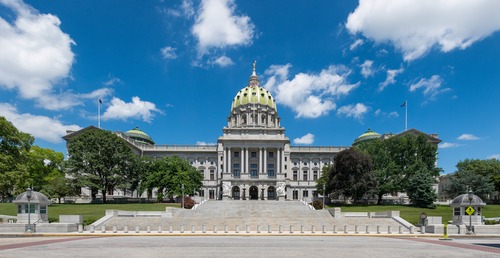
The Pennsylvania Senate Republican Caucus announced their intention to block all nominations to the state Public Utility Commission (PUC) until Gov. Tom Wolf revokes his “unilateral” decision to join the Regional Greenhouse Gas Initiative (RGGI).
The April 21 letter detailing the caucus decision was signed by all 27 Senate Republicans as well as Sen. John Yudichak (I-14).
The five-member PUC has been operating with only four commissioners since last April when former PUC Commissioner Andrew Place resigned. Wolf nominated Hayley Book, a senior adviser on energy and climate at the Department of Environmental Protection (DEP), to fill the vacancy in August. No action was taken by the Senate before the end of the legislative session and Wolf renominated Book in January. The Senate deadline for action is next month.
In defending the caucus decision, Sen. Joe Pittman (R-41), who has led the efforts of legislative involvement in RGGI, said they want Wolf to work transparently with the Legislature, particularly on determination of carbon taxes for the state.
“We have made it clear over the past 19 months that this is about the balance of powers in Pennsylvania,” Pittman said. “One of the key components of RGGI is a tax on carbon emissions. That in and of itself would destroy thousands of family-sustaining jobs across the Commonwealth. Beyond that, the power to tax is a function of the legislative branch, not the executive branch. It is dangerous precedent to tolerate the Governor unilaterally imposing a tax. This moratorium on confirmation of PUC nominees is a reminder to the Governor that Pennsylvania has three distinct and co-equal branches of government.”
On Oct. 3, 2019, Wolf directed the DEP to join RGGI, a collaboration of 11 Northeast and Mid-Atlantic States, which would set a cap on total carbon dioxide (CO2) emissions from electric power generators in each state. In order to comply with RGGI, power plants must purchase a credit or “allowance” for each ton of CO2 they emit.
If Pennsylvania joins RGGI, it would be the only major energy producing state in the compact and the resulting carbon tax on employers engaged in electric generations would devastate the industry and cost thousands of jobs, according to a release from the Senate Republican Caucus.
“If you believe that RGGI has value to the Commonwealth, then you should be confident to have it vetted properly through the legislative process,” the letter stated. “The current path to circumvent this process betrays both proper representation of our citizens, and any merit to this program that you may think exists.”
The senators continued, stating that they are willing to work with Wolf and his administration in discussing the program through committees and the legislative floor, but will not have the decision be made on their behalf.
In September 2020, the Legislature approved House Bill 2025, which would have created the
Pennsylvania Carbon Dioxide Cap and Trade Authorization Act, clarifying that the governor’s administration did not have the authority to unilaterally join RGGI, and prohibit the DEP from joining RGGI without Legislative approval. Wolf vetoed the bill on Sept. 24, 2020.
“Three DEP advisory panels have rejected the proposal, yet the Environmental Quality Board (EQB) still proceeded with developing regulations associated with RGGI. It is our understanding that the EQB plans to advance these regulations this summer, despite a clear constitutional requirement for involvement by the General Assembly,” the letter stated. “In lieu of this subversion of the constitutional process, and short of arguing this in a judicial setting, we are presented with very few options to reinstitute proper checks and balances in this particular situation. Therefore, we will be exercising our legislative authority to reject all future PUC nominees until you withdraw your executive order related to Pennsylvania’s inclusion in RGGI.”